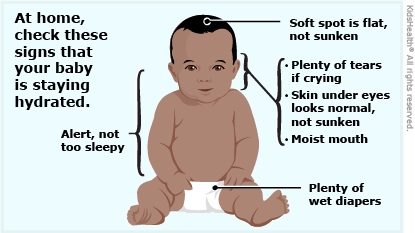When babies vomit (throw up), it is usually caused by a virus (a type of germ) and lasts only a day or two. Giving breast milk, formula, or an oral electrolyte solution (such as Pedialyte®, Enfalyte®, or a store brand), as recommended by your health care provider, will help you make sure your baby doesn't get dehydrated (not have enough water in the body). You can buy the oral electrolyte solution at drugstores or supermarkets without a prescription.
Here's how to take care of your baby.

Feeding your baby:
- Continue breastfeeding or formula feeding your baby unless they are vomiting repeatedly.
- Try breastfeeding or giving formula more often but for shorter amounts of time (5–10 minutes every 1–2 hours). You can also give formula or pumped breastmilk with an oral syringe, a medicine cup, or a kitchen teaspoon. You can slowly go back to your usual feeding schedule as long as your baby isn't vomiting.
- Your health care provider may want you to give your baby an oral electrolyte solution in addition to their regular feeding. Use a bottle, small cup, spoon, or syringe to give as directed by your health care provider.
- If your baby is eating solid foods, continue to offer their regular foods. As long as your baby is drinking, it's OK if they don't want solid foods at first.
If your baby is vomiting repeatedly, don't give them breastmilk, formula, or solid foods and give an oral electrolyte solution instead:
- Start giving the oral electrolyte solution right away. Even if your baby just vomited, you should still start the oral electrolyte solution.
- Give your baby 5–10 ml (1–2 teaspoons) of the oral electrolyte solution every few minutes. You can use an oral syringe, a medicine cup, or a kitchen spoon.
- After 1 hour, if your baby is not vomiting, increase the amount a little bit and give 15–20 ml (3–4 teaspoons).
- Continue to give this amount every few minutes for the next hour or two.
- If your child vomits again, go back to #1 and start this process over.
- Call your health care provider for what to do next. They may want to check your baby again.
Other important information:
- You will know your baby is getting enough liquids if:
- They have a wet diaper every 4 to 6 hours.
- Their mouth is moist.
- They have tears when they cry.
- Give any medicines as prescribed by your health care provider.
- If your baby already eats solids and hasn't vomited in 8 hours, offer small amounts of bland foods, such as cereal, crackers, applesauce, or bananas. If your baby drinks juice, start with watered-down juice at first. After 24 hours without vomiting, slowly go back to your baby's regular diet.
- Do NOT give your baby:
- Plain water, sports drinks, soda, or full-strength (undiluted) juice
- Medicines for nausea, diarrhea, or vomiting, unless told to by your health care provider
- Diluted (watered-down) formula
- Keep your baby out of childcare until they have had no vomiting, diarrhea, or fever for at least 24 hours.
- Wash your hands well and often. Viruses that cause vomiting are contagious (spread from person to person).

Your baby:
- Isn't drinking at all or has signs of dehydration, such as a dry or sticky mouth, sunken eyes or a soft spot on the head, more than 4–6 hours without a wet diaper, darker than usual pee, or crying with little or no tears
- Is 3 months or younger and has a rectal (taken in the bottom) temperature of 100.4°F (38°C) or higher
- Has vomit that's bright green, red, or brown
- Has forceful vomiting
- Is very tired and hard to wake up
You know your baby best. If your baby seems very sick or has symptoms that worry you, call your health care provider or take your baby to the ER.

Why do babies vomit? Vomiting usually happens in babies from an infection caused by a virus. The infection may also cause diarrhea and fever. Vomiting also can happen from formula or food allergies, gastroesophageal reflux (when liquids from the stomach flow backward up into the mouth), or very rarely, a blockage in the intestines.
How do oral electrolyte solutions help keep a baby hydrated? These solutions contain a balanced mix of water, electrolytes (sodium, chloride, and potassium), and sugars (glucose). They replace the liquids and electrolytes that a baby loses through diarrhea or vomiting, which helps prevent or treat dehydration and keep the body's electrolytes balanced.
Is spitting up the same as vomiting? No. Spitting up happens when there is an easy flow of liquid out of a baby's mouth, often with a burp. Spitting up doesn't cause discomfort. When a baby vomits, the stomach contents come up forcefully. Vomiting is uncomfortable and often happens a few times.
Does my baby need an antibiotic? Since viruses are the usual cause of vomiting in babies, an antibiotic won't help your baby. Antibiotics treat infections caused by bacteria, not viruses.




